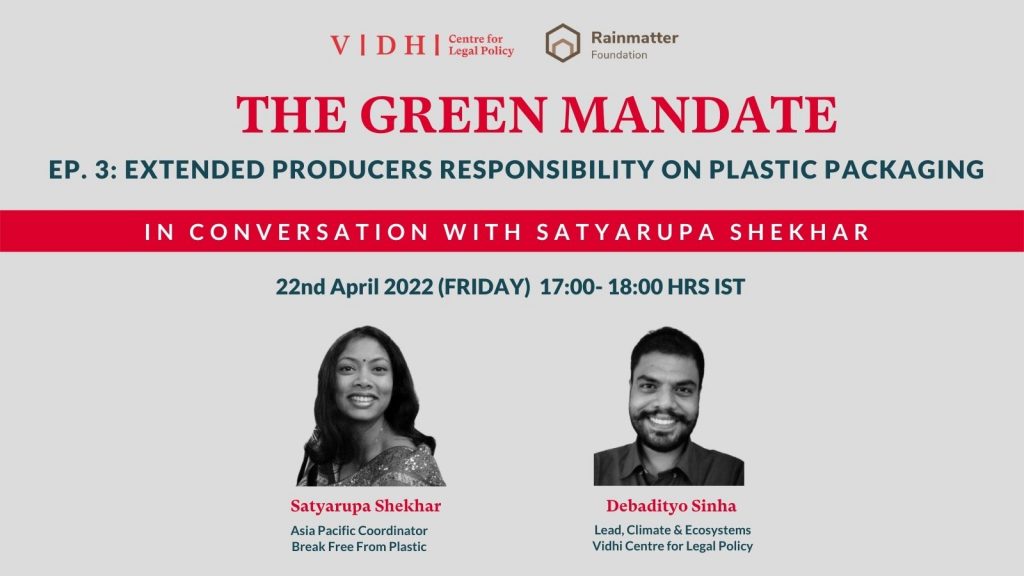Apr 2022
Green Mandate Ep. 3 – ‘Extended Producers Responsibility’ under Plastic Waste Management Rules, 2016 | In Conversation with Ms Satyarupa Shekhar

The Vidhi Centre for Legal Policy and Rainmatter Foundation invite you to the third episode of our recently launched conversation series THE GREEN MANDATE, on the ‘Extended Producers Responsibility on Plastic packaging under Plastic Waste Management Rules, 2016’ in conversation with Ms. Satyarupa Shekhar, Asia Pacific Coordinator, Break Free From Plastic. The conversation will take place online on 22nd April, at 5 pm IST.
About the Guidelines on Extended Producers Responsibility
The Government of India notified the Guidelines on Extended Producers Responsibility on plastic packaging under Plastic Waste Management Rules, 2016 on 16th February, 2022. These guidelines put the responsibility of reusing, recycling and disposing of plastic in a time bound and targeted manner on producers and importers of plastic, brand owners including online marketplaces and retailers. The guidelines also set up a market based tool which allows for sale and purchase of surplus extended producer responsibility certificates and enables the Pollution Control Boards to impose environmental compensation for non-fulfilment of extended producer responsibility targets. Earlier, the government had already mandated a ban on single use plastic from July, 2022.
About the Speaker
Ms. Satyarupa provides overall leadership and coordination in the Asia Pacific region, at Break Free From Plastic (BFFP) for the development of holistic and inclusive strategies to dramatically reduce plastic production, pollution, and usage. She works with and supports frontline communities and organisations working to promote sustainable, effective, and locally-driven initiatives.
Prior to joining BFFP, Satyarupa has worked with policy research and advocacy groups to make visible communities and issues that remain invisible to and neglected by governments and the general public. She has worked with Chennai’s city government and a Tamil Nadu state department to improve their data-management practices to plan civic infrastructure better, institute zero-waste systems and single-use plastic ban, and has supported the creation of data that has been used by the city government and courts to provide evidence for failures in service provision.
Satyarupa holds a Master’s degree in Economics from the University of Hyderabad, and a European Masters in Law and Economics degree.
Schedule: 22nd April, Friday, 17.00-18.00 HRS (IST)
- 17.00 hrs: Introduction
- 17.10 hrs: Discussion with Ms. Satyarupa Shekhar
- 17.40 hrs: Q&A with audience
About the Series
The UNEP Global Report on Environmental Rule of Law observed that despite a 38-fold increase in environmental laws worldwide since 1972, the greatest challenge to environmental protection remained partial enforcement and implementation.
India, a megadiverse country with 10 biogeographic zones and 4 biodiversity hotspots, is also the second most populous country in the world. The future of India’s natural heritage depends greatly on how we conserve and manage our natural resources and wildlife today. This not only requires the current laws to be firm, but also for the policy framework to remain dynamic and responsive to the new and emerging challenges.
Further, a nuanced understanding of the implementation challenges at the ground, regularly evaluating the impact of any new amendments to the laws, attending to the neglected aspects of the regulatory framework and contemplating the drivers which influence the law and policy making are some of the critical actions which are required on part of the state as well as the civil society.
THE GREEN MANDATE provides a platform for an in-depth conversation on such issues affecting current conservation challenges and aims at developing a deeper public discourse on the law and policy aspects of it.